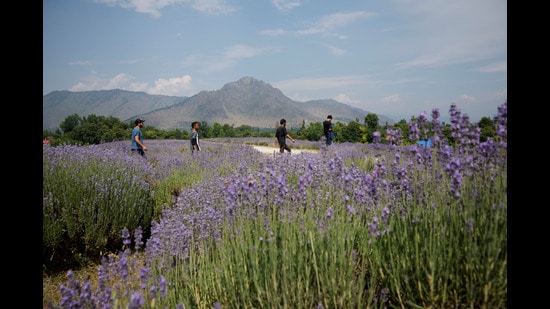India is now celebrated as the third largest startup ecosystem in the world and boasts some of the fastest growing unicorns. This impressive expansion goes back to Prime Minister (PM) Narendra Modi, who in 2016 gave a speech from the Red Fort of ‘Start-up India, stand up India’. Since then, the number of start-ups has soared from just over 350-400 in 2014 to over 130,000 in 2024, with each of the more than 110 unicorns being the benchmarks of this business journey in the country.

In the midst of this business boom, India’s agriculture sector has also seen many transformative changes. Jammu and Kashmir (J&K), where agriculture employs about 65% of the population and contributes around 27% to the economy of the Union Territory (UT), has historically faced challenges. The region’s difficult terrain, the threat of monkeys, and poor accessibility have limited extensive land use, limiting cultivation to traditional crops such as rice, corn, wheat, and pulses, all of which often do not provide enough income for farmers.
Under the Modi government, the Council of Scientific and Industrial Research (CSIR), Ministry of Science and Technology, launched the Jammu and Kashmir Aroma Arogya Gram (JAAG) project to address some of these agricultural challenges or provide an alternative solution through alternative crops . This innovative initiative, popularly known as Aroma Mission, introduced cultivation and processing of Medicinal and Aromatic Plants (MAP) using advanced CSIR technologies. This, in turn, paved the way for India’s Purple Revolution.
Registered farmers received free, high-quality planting material for half an acre of land and provided comprehensive training in MAP cultivation, processing and marketing. The initiative has significantly increased farmers’ income and created new employment opportunities in the rural areas of UT.
The lavender cultivation aspect of this project, championed by young entrepreneurs, shattered the misconception that start-ups are largely, if not exclusively, limited to the areas of digital and information technology, with many young people leaving jobs. profit-making corporations to engage in profitable lavender cultivation. . This success story, originating from the small town of Bhaderwah in the remote and hilly district of Doda, led to the adoption of lavender cultivation, which was also reintroduced to other districts of J&K. In fact, many Himalayan states like Uttarakhand, Himachal Pradesh, Arunachal Pradesh and Nagaland have started similar cultivation to provide better income to their farmers.
CSIR provided all kinds of support, including appropriate technological support at every stage, from cultivation to distillation in facilities dedicated to developing a wide range of lavender products to arranging market linkages with the industry. Today, more than 1,300 hectares in J&K are under lavender cultivation, with notable progress in Ramnagar. textile of Udhampur district. Awareness campaigns on the plant’s prospects for farm profitability were also conducted at Mendhar, Poonch and Rajouri.
The impact of this initiative has gained national recognition. The lavender farms of Bhaderwah were featured in this year’s Republic Day tableau at Kartavya Path, and these fields have become popular tourist attractions, further boosting the local economy.
In the 99th edition of his Mann Ki Baat address to the nation, Prime Minister Modi mentioned the role of CSIR-Indian Institute of Integrative Medicine in supporting lavender cultivation. This year, Doda district alone extracted 100 kg of fresh lavender oil, with farmers harvesting nearly 10 quintals of dried flowers, valued at ₹800-1,000 per kg. one channel (roughly equivalent to 506 square meters) of land produces 80-90 kg of flowers, and farmers sold high-quality planting material worth ₹45 thousand
This initiative has not only increased the income of the farmers of Jammu and Kashmir but also opened a new vista for agribusiness. It creates various opportunities in value-added medicinal and cosmetic products. The lavender success story is a textbook example of the powerful synergy between research, academia, industry and local youth entrepreneurship, more of which is needed to move the country forward on the path to developed nation status.
Dr. Jitendra Singh is the Minister of State (Independent Charge) for Science and Technology. The opinions expressed are personal
#JKs #purple #revolution #flourishing #agricultural #startups